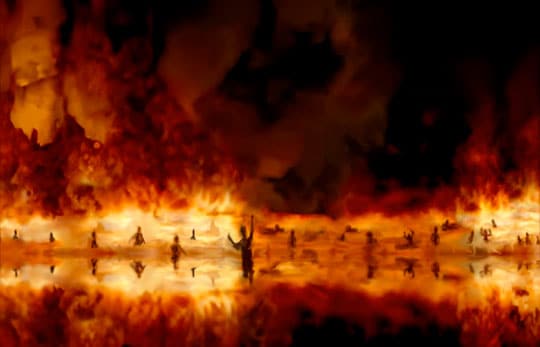Bible Question:
Where in the Bible does it speak of Jesus going to hell/Hades after His death?
Bible Answer:
Scripture tells us that after Jesus’ death, His spirit went to heaven or Paradise. We know this because when Jesus was on the cross, He told a thief who was hanging next to Him that he would be in Paradise with Him that very day,
And He said to him, “Truly I say to you, today you shall be with Me in Paradise.” Luke 23:43 (NASB)
Therefore, Jesus went to Paradise or heaven on the day of His crucifixion. 2 Corinthians 12:2-4 reveals that Paradise was another name for heaven. But what else did He do before He was resurrected on Sunday?

The Abyss Within Hades
Before answering the question, it is important to know that in the Old Testament, the grave is called Sheol. In the New Testament, Sheol is called Hades (compare Psalms 16:10 and Acts 2:31). Hell is always the place where the souls or the spirits of the wicked go after death (Mark 9:43). A comparison of Scriptures reveals that the lake of fire is a description of hell in the book of Revelation. Hades is not hell. Revelation 20:14 says that Hades is thrown into the lake of fire.
In addition, the New Testament refers to a place called the abyss (Luke 8:31; Revelation 20:1, 3). It is a compartment within Hades. Then in 1 Peter 3:18-19 we read that Jesus visited “the spirits now in prison.”
For Christ also died for sins once for all, the just for the unjust, so that He might bring us to God, having been put to death in the flesh, but made alive in the spirit; in which also He went and made proclamation to the spirits now in prison . . . 1 Peter 3:18-19 (NASB)
Notice that these spirits are in prison. In Luke 8:31 this prison is called the abyss and in Jude 6 it is called eternal bonds. This is not hell, Sheol, Hades, or the Lake of Fire. The abyss is a compartment within Hades. But Scripture does not tell us that Jesus entered hell. Those who read the King James Bible (KJV) are misled by the translation of the Hebrew word that is normally translated as Sheol in Psalms 16:10. There the KJV translates the Hebrew word as hell and not Sheol. Therefore, Jesus did not go to hell. He went to Sheol.
So, Peter 3:18-19 reveals that Jesus announced victory for those spirits or demons that were in the abyss. These demons were involved in the sin described in Genesis 6, when fallen angels cohabitated with some women.
Christ Declared Victory Over the Satanic Hosts
There are some who would disagree that Christ announced victory over the demons in the abyss. One reason is that they assume Jesus preached a salvation message to the fallen angels, but 1 Peter 3:18-19 does not say that. The Greek word for proclamation in verse 18 is not the Greek word meaning “good news” or “the gospel.” That Greek word is evangelion. The Greek word translated as proclamation is kerusso which means “to herald” or “officiate as a herald.” It is the common word in the New Testament having the idea “to announce.” In this case, Jesus declared His accomplishment. He declared victory over Satan and his kingdom of demons. Nor did Jesus need to go to hell as some are currently teaching to pay for His sins. That teaching cannot be supported by this passage since it does not say that nor do any other Scriptures support that view. Jesus was the perfect lamb of God – He was sinless even though He took the sins of the world upon Himself on the cross (1 Peter 2:24). Hebrews 4:15 teaches that Jesus was . . .
. . . tempted in all things as we are, yet without sin. Hebrews 4:15 (NASB)
1 Peter 3:18-19 reveals that Jesus announced victory over the demons. For more information listen to the sermon “The Victory Of Christ Over Everything.”
Why Christ Announced Victory
When did Jesus visit the demons in prison? 1 Peter 3:19 states “in which also He went and made proclamation to the spirits now in prison.” This suggests two things. First, Christ visited the demons in His spirit. “Spirit” does not refer to the Holy Spirit but to Jesus Christ’s own spirit (1 Peter 3:18-19). Second, Christ’s visit occurred after His death and before His resurrection. Luke 23:43 clearly reveals Jesus went to heaven on Friday, the day of His death. That is, He announced victory after His death since His death achieved the victory over Satan and death (Hebrews 2:14-15).
Therefore, since the children share in flesh and blood,He Himself likewise also partook of the same, that through death He might render powerless him who had the power of death, that is, the devil, and might free those who through fear of death were subject to slavery all their lives. Hebrews 2:14-15 (NASB)
He also achieved victory over sin (1 Corinthians 15:54-57).
Conclusion:
Jesus was the sinless God-man who made it possible for us to have our sins forgiven. He descended into Sheol after His death on the cross, ascended into paradise, was resurrected and forty days later returned to heaven until His second coming.
Suggested Links:
The Grief of God - sermonThe Victory Of Christ Over Everything
Did Jesus’ body and spirit die?
Did Jesus descend into hell?
Was Jesus dragged into hell by Satan and tortured?